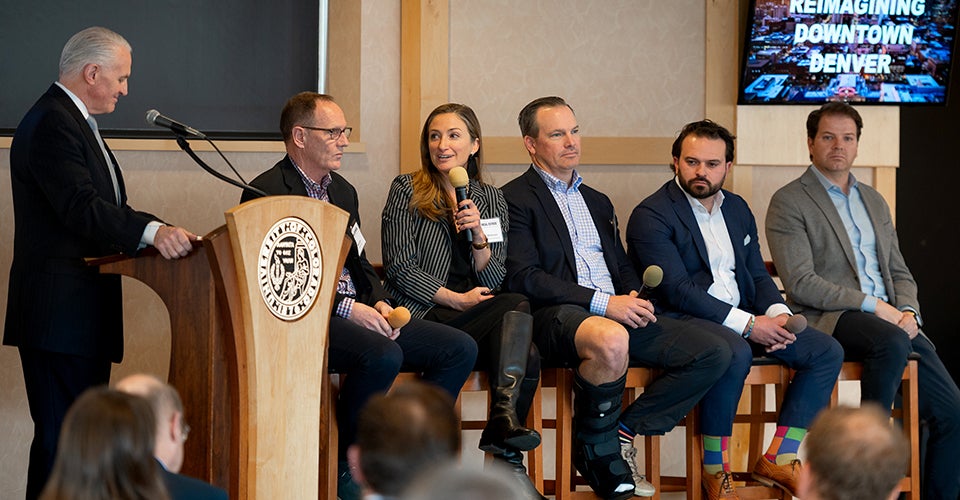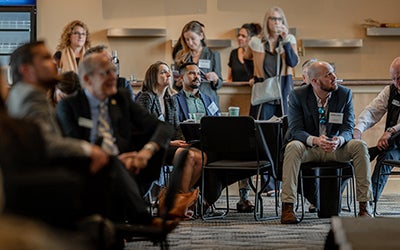CUREC’s annual showcase event attracts top industry players to discuss pandemic recovery, new projects and policy challenges.

Sarah Wiebenson, center, director of economic development for the Downtown Denver Partnership, speaks during a panel discussion on opportunities for the industry as it shifts out of the pandemic. She is working with partners across the city ‘to reimagine downtown Denver, and to see this as an opportunity to not just build back, but build back better.’ Below, a group of professionals listens to a discussion on policy trends coming out of Washington.
If the first three rules of real estate are location, location, location, it’s telling that for the first time, the CU Real Estate Center moved its annual forum from the skyscrapers of Denver to the foothills of Boulder.
It also signifies just how strong the ties between the Leeds School of Business and the real estate community have become. A full-capacity crowd of more than 260 attendees registered for the daylong event at Folsom Field, including 61 industry representatives who participated in a recruiting fair.
“I think bringing this event to Boulder, back to the university, is a fitting way to connect this event back to what’s happening here, and to the impact the CU Real Estate Center has created in the community,” said Bradley Segall, business development manager for Denison Parking and chair of the forum committee, in his opening remarks. “And it’s fantastic to see so many students joining us today, as well.”
And like the collaboration between CUREC and the real estate industry, a major message of the forum was how to identify partners and work together in helping Colorado rebound from the pandemic.
‘Pedestrian life is disintegrating’
A fireside chat between Michael P. Kercheval, CUREC executive director, and Daniel McCaffery, chairman and CEO of McCaffery Interests, looked at the challenges of bringing people back to cities like Denver.
On a typical night in Denver’s RiNo neighborhood, “you can count the number of people walking by on one hand, maybe two,” McCaffery said. “Pedestrian life is disintegrating. We have to magnetize the streets once more.”
A big catalyst for bringing people back, he said, is small retailers. Most developments now have residential down to street level. Compared to bustling cities in Europe, with “smaller, but more energetic, stores that invite movement from place to place,” American cities are offering fewer places to gather.
As to the office sector, McCaffery said, the outlook remains uncertain.

“We need peoples’ mindset to back to where it was, but I’m not sure how we turn that corner.”
Daniel McCaffery, chairman and CEO, McCaffery Interests
“Our home building in Chicago is 90 percent leased,” he said. “But the next time I see someone in the men’s room, I may pull out my phone and call you. I’m not looking forward to the day some of our big tenants’ leases are up for renewal.
“Something has to happen—we need peoples’ mindset to back to where it was, but I’m not sure how we turn that corner.”
 For some neighborhoods, coming back has been far less of a challenge. Jamie Gard, an executive managing director at Newmark, said the Cherry Creek neighborhood “is boring. But that’s what’s fantastic about it.”
For some neighborhoods, coming back has been far less of a challenge. Jamie Gard, an executive managing director at Newmark, said the Cherry Creek neighborhood “is boring. But that’s what’s fantastic about it.”
Another session, spotlighting different projects in Denver and on the Front Range, was an opportunity for developers and others to talk about the trends they’d observed since the outbreak.
Sarah Wiebenson, director of economic development for the Downtown Denver Partnership, started her role during the recovery period from the pandemic. The solution to the challenges of revival, she said, is in fostering partnerships “to reimagine downtown Denver, and to see this as an opportunity to not just build back, but build back better.”
“Many high-quality companies have said, ‘We think we can get people to come back to work in Cherry Creek first,’ and to some degree, they never left,” said Gard, who pointed to occupancy rates of 90 percent before and after the pandemic. “That doesn’t exist maybe anywhere else in the country. It is truly an amazing market.”
Focus on finance, banking
Looming large over the event was the collapse of Silicon Valley and Signature banks and Credit Suisse’s stock price slide, which happened in real time during Wednesday’s event. Sessions on Colorado’s economic outlook, the legislative climate in Washington and the pandemic rebound focused on the challenges the real estate industry faces amid disruption in the banking sector.
“The volatility of this financial crisis has happened before,” he said. “Developers rallied around a master plan” for the Union Station neighborhood, he said, as “they saw the value of being in a master plan and felt safe there.”
“For the students here, I would encourage you to look at this holistically,” said Sarah Cullen, founder and president of SideCar Public Relations, who spoke about news and trends coming out of Washington with Chip Rodgers, senior vice president of the nonprofit Real Estate Roundtable. “Based on what we saw this weekend—what does this mean, for example, for our regional banks that support so much of our commercial development? How are these things starting to connect—banking, policy, the demands from the past couple years from the pandemic?”
The policy session looked at the challenges the industry faces in a sharply divided Washington, with very different ideas of how to deal with issues like affordable housing,
Richard Wobbekind, associate dean for business and government relations and senior economist at Leeds, offered a forecast that he called “not completely negative; we’re actually feeling pretty positive.”
“We are seeing a lot of good things, especially related to employment and GDP,” Wobbekind said, noting that Colorado is top-two in the country for both personal income and per capital income growth.
More Featured Insights and News From CUREC
Julie Gibson Poised to Lead CU Boulder’s Real Estate Center










